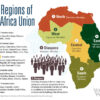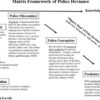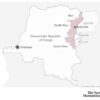Follow
Africa needs a new generation of civil servants — and we’re helping find them
— Betsy Williams
More than 10 years ago, I moved from the US to Liberia to serve as an assistant to the minister of health, inspired by Ellen Johnson Sirleaf’s historic election as Africa’s first female president and the opportunity to support her administration.
For Liberia, 2007 was a time of infinite needs — and opportunities. More than 20 years of conflict had decimated the country’s physical infrastructure, including buildings, roads and power systems, and destroyed almost all institutions of the government, economy and daily life.
But two years into President Sirleaf’s administration, the country was on the move, with a clear plan to accelerate development. Sirleaf had recognised the critical role of civil service leadership in delivering on some tough promises — to restore essential services in health and education, launch bold projects for power, agriculture, infrastructure, boost the economy and restore democratic rule.
Through several programs targeted at the diaspora and foreigners, top talent was recruited to reinforce a broken government workforce. Senior advisors, activists and philanthropists from all over the world came to help Liberia.
“Something was missing: an opportunity for young Liberians to be part of the reconstruction of their country”
But something was missing: an opportunity for young Liberians to be part of the reconstruction of their country and to learn from the skills and experience of foreign experts.
For many ambitious and talented young Liberians, the civil service — with few financial rewards and limited social recognition — held little appeal in comparison to the private sector or international work. They were more interested in working for the US Embassy, UN Mission, or one of many international NGOs establishing offices in Monrovia.
In this environment, I founded the President’s Young Professionals Program (PYPP), which invests in Liberia’s own talent by recruiting top performers into civil service positions and giving them the support and architecture they need to be successful.
It was designed to change the perception of public service into an opportunity, not a fallback, and to ensure a cadre of talented and ethical leaders in the right positions for years to come. Since 2009, more than 140 impressive young leaders have been recruited through the program.
The secret sauce
When we created PYPP, we had assumed similar efforts were already in place elsewhere in Africa. The idea seemed simple enough, and I knew similar programs doing this in the US and Canada for many years.
But we were wrong. There has been an extraordinary amount of investment in African youth leadership and employment in critical spheres from entrepreneurship to the media — Africa Leadership Academy, Teach for All, Ashoka Fellows, to name but a few. But creating and supporting opportunities in public service has been overlooked and underinvested. As Mo Ibrahim said last spring, public service is the “unsung hero” or overlooked piece of Africa’s future.
“Civil service is the secret sauce to strengthening a country’s ability to deliver services to its people”
After a decade of experience, I believe more strongly than ever that the civil service is the secret sauce to strengthening a country’s ability to deliver services to its people. In both new and established governments, investing in a diverse, professionalized civil service that attracts the next generation of young leaders can help ensure a stable democracy for years to come.
It’s why PYPP has had such important impact, and it’s the driving force behind the vision of Emerging Public Leaders (EPL), an organisation I founded in 2016 to expand the model across the continent.
This month, we launched our second country program in Ghana, and we’re planning two further programs for 2019. The long-term vision is to build a pan-African network of 500+ professional and ethical public service leaders.
Six lessons
Of course, building capacity for civil service and attracting top young talent from the private sector is not easy, especially in countries where many believe the system is broken beyond repair.
As we embark on work across the continent, and other organisations and countries look increasingly to civil service as their own secret sauce, there is much to bear in mind. While we’ve celebrated many successes, we’ve also encountered obstacles along the way. From my reflections on these years of work, here are six key lessons for future reform efforts.
- Youth are interested in changing government — but need concrete opportunities, support and resources. Ensuring an open, meritocratic and competitive recruitment process is essential — a system that feels rigged will deter top talent. As is creating an enabling work environment where hard work is rewarded. This generation wants the opportunity to make an impact. Strong support architecture, including mentorship and training, can make up for a lack of financial incentives. It can be as simple as having a clean desk, working internet, a responsive supervisor and exposure and proximity to decision-making.
- Getting serious buy-in from political leaders and public servants is critical for successful transformation. This means more than a memo of understanding: it requires partnership, through consultation, shared investment and vision. In Ghana, for example, we have worked closely with senior cabinet ministers, but also with career professionals from the civil service and bureaucracy.
- It’s tough — but essential — to convince the private sector to invest in public service. In many countries, people have given up on government as a whole. But when a civil service is strong, responsive and can adequately deliver services, it will transform views of the kind of force for good government can be. Good government enables effective business and profit-making. So businesses should see investing in the public service as both a responsibility and a huge opportunity.
- Simply introducing ambitious, young public servants to each other can initiate extremely powerful networks. There is something potent about going through difficult experiences with camaraderie and support from peers. In our Liberia and Ghana programs, we’ve seen strong peer bonds built through the selection process, orientation, monthly gatherings and daily interactions. Networks help get through inevitable challenges — and can also accelerate impact. It’s hard to overstate the importance of having trusted, competent and available coworkers within and beyond your organisation. Investing in alumni is a critical piece of EPL.
- Patience and humility are crucial. Building civil service capacity and creating systems change cannot be accomplished in months, or even a few years. It takes time to strengthen the sector and gain citizens’ trust. I encourage change-makers not to get into this work thinking change will happen overnight; when the change does happen, though, it’s truly magical.
- The recent wave of big bets in philanthropy and commitments to scale innovation is exciting — but the “secret sauce” is missing. There has been a lot of attention on bold investments and ambitious experiments across Africa — expanding mobile health, increasing digital education, innovating in agriculture — all with tremendous impact potential. But these big bets come at a price, sometimes without full appreciation of the investments needed across all sectors, especially the public service, to sustain them for years to come. One example: recent excitement around paying community health volunteers. Initially funded by philanthropy and then development partners, long-term responsibility for funding these workers will fall on public financial systems.
These issues will be explored in more depth in the coming series of articles from leaders and organisations who are all playing, in their own ways, a critical part in efforts to transform Africa’s civil services. We will share our experiences, insights and tips on how to think differently about working with governments in Africa, and on the investments that are needed to encourage and engage the next generation to be public sector leaders of the future.
“Without more investment in young people in government today we will miss a unique opportunity”
We cannot take for granted just how critical having a motivated, ethical and competent civil service is to ensuring good governance and inclusive growth, for everyone, and especially in Africa. And, while a movement has begun, without more investment in young people and meaningful opportunities for them in government today — from funders, partners and new countries’ political leaders — we are all missing a unique opportunity for decisive transformation.
Building a strong, competent and ethical civil service is important, necessary — and the innovation of this time. — Betsy Williams














